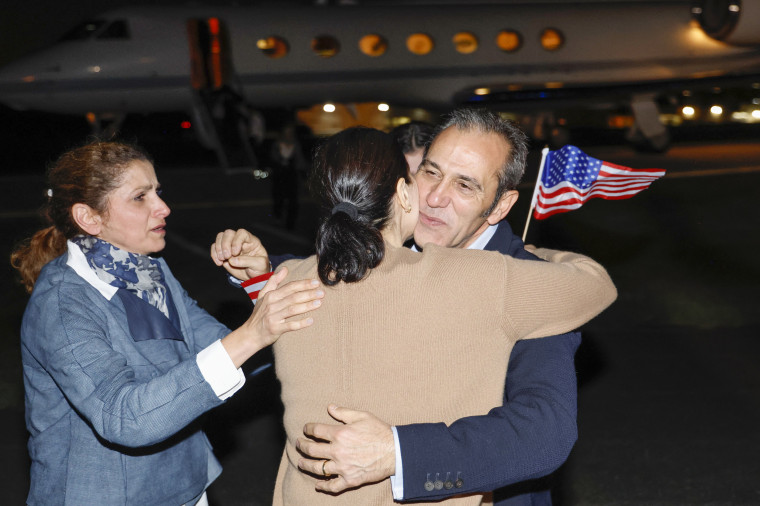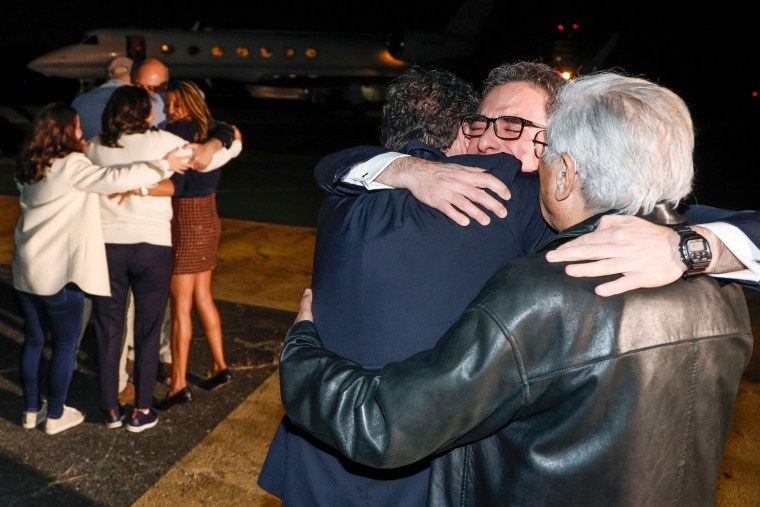Five Americans who were released after being wrongfully imprisoned in Iran for years made an emotional return to U.S. soil on Tuesday.
A plane carrying the five Americans and two of their relatives touched down at 5.25 a.m. ET at a military airfield near Washington, D.C. They had flown from the Gulf state of Qatar, which helped facilitate the transfer.
The group were freed as part of a prisoner exchange agreement that allowed Tehran to access $6 billion in oil revenues frozen under U.S. sanctions and also saw five Iranian nationals released from U.S. custody.
The rare, high-stakes deal comes despite heightened tensions between the two countries over a range of issues including Iran's uranium enrichment program and crackdown on internal dissent — the weekend marked a year since Mahsa Amini's death sparked a wave of domestic unrest.
NBC News first reported on the prisoner swap negotiations in February.

There were emotional scenes on the tarmac when the freed Americans left the jet to be reunited with family and friends, many waving small U.S. flags as they tearfully embraced.
The former prisoners then posed for a group photograph alongside their families, calling out: “Freedom!”
"We’ve all looked forward to this day," said Roger Carstens, the special presidential envoy for hostage affairs. He said the group would "maintain the fight" in helping to bring back other detained Americans.
Siamak Namazi, 51, was imprisoned for almost eight years, the longest stretch of the five American prisoners. He was arrested in 2015 on charges of espionage and convicted in a trial that lasted a few hours.

Emad Shargi, 59, an Iranian-born businessman who moved to the U.S. as a young man, was arrested in 2018. Despite being released and cleared of all charges in 2019, Iranian authorities retained his passport, before he was charged again in 2020 and convicted of espionage charges without a trial.
A third former prisoner, Morad Tahbaz, 67, is an Iranian-American who also has British citizenship. Part of a group of environmental activists carrying out research on Iran’s endangered cheetah population, he was arrested in 2018 and convicted of espionage in 2019.
The families of the two other former prisoners have requested that their identities remain private, U.S. officials said.
Two unnamed family members were also on the flight from Qatar.
“We are still absorbing the enormity of coming back home and to freedom,” Tahbaz said in a statement. He said his thoughts were with eight Iranian conservationists who were arrested and imprisoned along with him.
"Unfortunately, my friend and colleague, Kavous Seyed Emami, did not survive. Ever since, I have been left with a void in my heart," he said. "My pain remains as my dear friends and colleagues still remain in Evin Prison. I cannot express how much I long to see them free, back in the deserts and mountains."
Human rights groups accuse Iran of charging the prisoners with espionage without any foundation — but Iran says they were treated in accordance with the law.
The deal comes as President Joe Biden and Iranian President Ebrahim Raisi were due to attend the annual gathering of world leaders for the United Nations General Assembly in New York on Tuesday.
Biden has come under criticism from Republicans for agreeing to a deal they say amounts to a “ransom” payment that will likely only encourage Tehran to imprison more foreigners.
The administration has maintained that Iran will only be permitted to use the funds unblocked by the U.S. for medicine, food or other humanitarian purchases.
But Raisi told NBC News’ Lester Holt in an exclusive interview that Tehran will decide how to spend the $6 billion. The money will be spent “wherever we need it,” he said.
